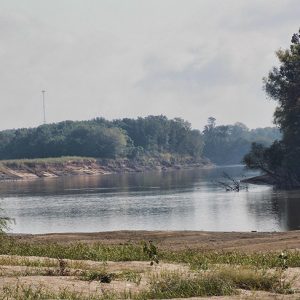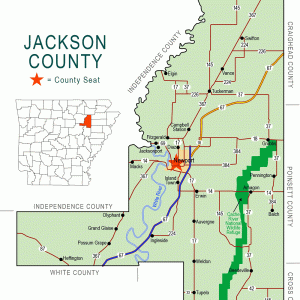calsfoundation@cals.org
Elizabeth (Jackson County)
Elizabeth (sometimes called Elizabethtown) thrived as a port on the White River and became the seat of Jackson County in 1839. However, the river later shifted course and eroded away what remained of the community.
Native Americans were the first to take advantage of the Black and White rivers for transportation and trade, followed by French hunters, trappers, and fur traders, many of them from Canada, who plied the area’s rivers during the eighteenth century and continued after the Louisiana Purchase of 1803 until about 1815. Keelboats were an early mode of transportation for the early settlers, who could use them on the upper White River to maneuver the sharp bends, rapids, and low water levels along the river during the summer months.
The first county seat of Jackson County, following the county’s creation on November 5, 1829, was at the centrally located house of early pioneer Thomas Wideman. In 1832, the seat of government was moved two miles to Litchfield, the first permanent settlement organized in the county.
In 1837, Noadiah Marsh, an Oil Trough (Independence County) planter, and a Batesville (Independence County) merchant named Aaron Woodruff Lyon, who was a veteran of the War of 1812, developed and promoted Elizabeth, which replaced Litchfield as the county seat in 1839. This settlement quickly became the busiest town on the White River. Elizabeth received its name from the wives of co-founders Lyon and Marsh: Elizabeth Agnew Lyon of Princeton, New Jersey, and Elizabeth Craig Marsh of Oil Trough. Aaron Lyon had also been born in Elizabeth, New Jersey, so the name was important to him.
In 1831, riverboat traffic began on the White River when the Waverly journeyed upstream to Batesville, helping to make Elizabeth a significant river port. In addition, the town was near an established east-west road, often referred to as the Military Road, that passed through the county. Elizabeth remained the county seat until 1852. A two-story Georgian-style brick courthouse was completed by 1842 in Elizabeth at a cost of $12,000 to replace the small wooden one in Litchfield. Elizabeth was a typical riverfront town of the antebellum era, with stores, a blacksmith shop, a cotton gin, a grist mill, and an inn where liquor was sold. It was also a farming town with cotton fields in the rich bottomlands around it. A post office was established in 1839 with Noadiah Marsh appointed postmaster. The post office was part of a general store run by Marsh and his wife, a post he held until just before his death in 1851.
Though a popular riverboat town, Elizabeth proved to be too close to the White River, and a devastating flood in 1844 washed away half the town, undercut part of the river bank, and did extensive damage to the new, expensive courthouse. The community never fully recovered from this natural disaster.
The citizens of the county scouted for a new location for the county seat and, in 1852, moved the seat of government temporarily to Augusta (Woodruff County). A year later, in 1853, a more suitable replacement for Elizabeth was found two miles upstream at the confluence of the Black and White rivers at Jacksonport (Jackson County), a riverboat settlement developed by riverboat captain, business entrepreneur, planter, and race horse enthusiast Thomas Todd Tunstall, who made his home along the banks of Dota Creek in the Big Bottom lands of Independence County, where he also established a popular racetrack on his plantation for his thoroughbreds. The demise of the post office in 1856 marked an end to Elizabeth as a community.
Elizabeth disappeared from the map, and much of it was reclaimed by the White River. The new county seat of Jacksonport became an important induction and mustering-out point for soldiers during the Civil War. Noadiah and Elizabeth Marsh were buried in the McGuire Cemetery (a.k.a. Kelley Cemetery) in Oil Trough. Their graves were later moved to Oaklawn Cemetery in Batesville. What happened to the original tombstones is unknown. Where the McGuire Cemetery was located is now a residential area.
For additional information:
“The Courthouses of Jackson County.” Little Rock: Arkansas Department of Parks and Tourism, n.d.
Griffith, Nancy Snell. “Aaron Woodruff Lyon: Pioneer Educator, Citizen and Christian Gentleman.” Independence County Chronicle 35 (October 1993–January 1994): 52–67.
Huddleston, Duane. “Of Race Horses and Steamboats, the Pride of Captain Thomas Todd Tunstall.” Special issue. Independence County Chronicle 14 (January 1973).
———. “Noadiah Marsh: Founder of Elizabeth.” Stream of History 15 (October 1977): 3–12.
Obituary of Aaron W. Lyon. Daily Arkansas Gazette, November 29, 1888, p. 3.
Kenneth Rorie
Van Buren, Arkansas






Comments
No comments on this entry yet.